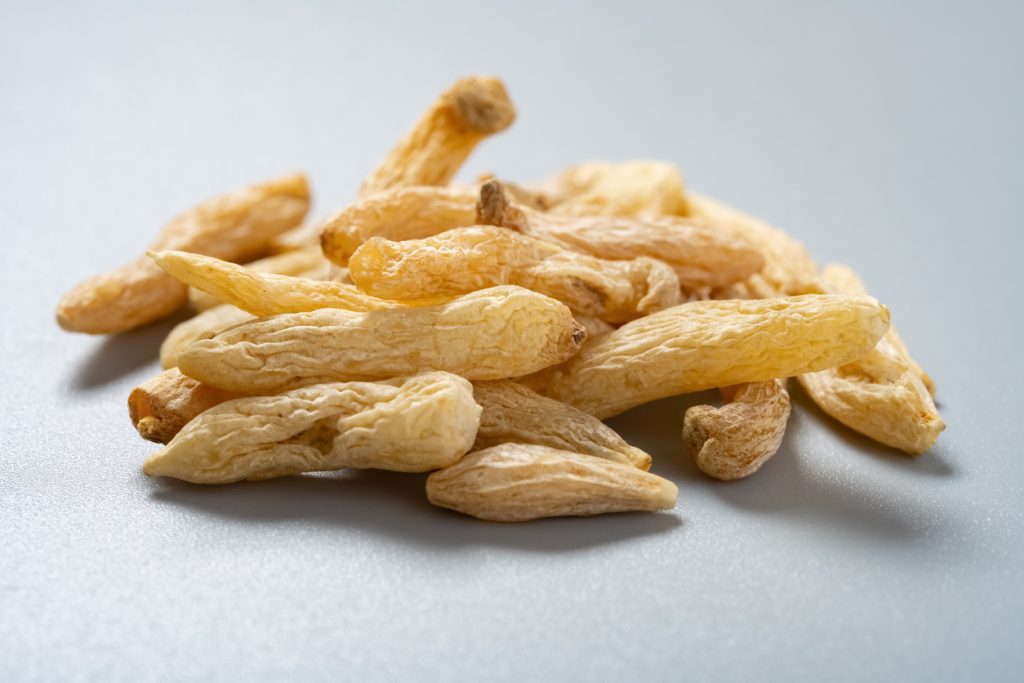Radix Ophiopogonis (Mai Dong)

What is Radix Ophiopogonis (Mai Dong)?
Radix Ophiopogonis (mai dong, 麦冬), also known as Dwarf Lilyturf Tuber, Dwarf Lilyturf Root and Ophiopogon Japonicus Root, refers to the tuberous roots of Ophiopogon Japnicus, an evergreen perennial plant that belongs to the Liliaceae family. This plant has long, thin and green leaves, as well as tuberous white roots. These roots are typically harvested in summer, cleansed and dried under the sun for medicinal usage.
The name of Ophiopogon comes from the Greek words ‘ophis’ and ‘pogon’, where the former means snake and the latter means beard. Other than being used medicinally, Ophiopogon Japnicus is also grown in ornamental gardens as a ground cover and as a decorative plant for freshwater aquaria. However, as it is not a true aquatic plant, it can only live for a few months underwater before it dies.
In Traditional Chinese Medicine (TCM), Mai Dong falls under the category of ‘Tonic herbs for Yin Deficiency’. Such herbs are used for patterns of deficiency to replenish one’s ‘Four Treasures’ (qi, blood, yin, yang). Cool in nature, Mai Dong can help individuals who have too much Heat in their body, such as those experiencing a Yang Excess or a Yin Deficiency, to restore a harmonious yin-yang balance.
Bitter and sweet in taste, Mai Dong can cleanse the body by clearing Heat, drying Dampness and promoting elimination via urination or bowel movements. The herb can also slow down acute reactions, detoxify the body and has a tonic effect on the body by replenishing qi and blood. In particular, Mai Dong targets the Heart, the Lungs and the stomach.
Functions and Benefits of Radix Ophiopogonis (Mai Dong)
Traditional Chinese Medicine (TCM) shows that Mai Dong has the following health benefits.
Mai Dong can nourish stomach yin, clear stomach Heat, promote the production of fluids and moisten intestines. The herb is thus indicated for stomach Yin Deficiency symptoms such as dryness in mouth and thirst, pain in stomach and abdomen, hunger without appetite, vomiting due to the ascending of qi, dryness in intestines and constipation.
Mai Dong can also nourish Lungs yin, clear Heat in Lungs and relieve sore throat. Thus, the herb is often indicated for dryness in nose and throat, dry cough with little phlegm or blood in phlegm, pain in throat, hoarseness and discomfort in vocal cords.
As Mai Dong can nourish Heart yin, clear Heart Heat, calm one’s Heart and induce tranquilization, it is also indicated for restlessness, insomnia, dream-disturbed sleep, poor memory, irritability and palpitation.
Other than the above Radix ophiopogonis benefits, modern studies have suggested that Mai Dong consists of a variety of anti-inflammatory components which can help to reduce inflammation and combat inflammatory diseases. As the herb contains polysaccharides that can activate macrophages in the body, it may also help to boost one’s immune system.
Mai Dong may help the body to produce mucus to moisten the Lungs and reduce inflammation in the Lungs, which makes it a potential treatment for different respiratory problems. The antioxidants and anti-inflammatory compounds in Mai Dong also help to improve blood flow and consequently heart health. It may even help to manage diabetes by reducing blood sugar levels and increasing insulin sensitivity. In addition, Mai Dong may possess anti-cancer effects and anti-microbial properties.

How to Use Radix Ophiopogonis (Mai Dong)
The recommended daily dosage of Mai Dong is 5 – 10g, when used as a decoction.
Mai Dong is most commonly available as a whole, uncut root. Fresh Mai Dong is considered to be of better quality than hard, dry tubers. Mai Dong may also be available in other supplement forms such as powder, or part of another herbal formula.
Traditionally, Mai Dong is prepared as a decoction, which involves boiling the root in water for about one hour or even longer. Alternatively, dried or granular decoctions are prepared by cooking Mai Dong in large tanks, straining and evaporating the liquid to collect the remaining syrup, and passing the syrup through a spray dryer to obtain a dried product. In addition, Mai Dong powder can be made by drying the root and grinding it.
Cautions and Side Effects of Radix Ophiopogonis (Mai Dong)
Mai Dong should not be used by individuals who have a weak Spleen or stomach, or are experiencing diarrhea, congested fluids such as turbid phlegm, and early-stage Wind-Cold coughs.
Also, as the usage of this herb may cause drowsiness, do refrain from operating heavy machinery after using this herb. Other side effects associated with the use of Mai Dong include nausea, vomiting, anxiety, restlessness, acute abdominal pain, itching and delirium.
We strongly encourage you to consult your healthcare provider before deciding to Mai Dong to your healthcare routine!
Summary
Here is a summary for Radix Ophiopogonis (Mai Dong):
- Herb name (Chinese): 麦冬
- Herb name (Pin Yin): mài dōng
- Herb name (English): Dwarf Lilyturf Tuber
- Herb name (Botanical): Radix Ophiopogonis
- Origin of species: Ophiopogon japonicus (Thunb.) Ker-Gawl.
- Part(s) of herb used: Root tuber
- Geo-specific habitat(s): Sichuan, Zhejiang, Jiangsu
- Taste(s) & Properties: Sweet, slightly bitter; Slightly cold; Administrates the Heart, Lung and Stomach Meridians
- Actions: Eases stomach discomforts with symptoms including constant thirst and constipation; Relieves chronic and dry coughs; Helps to calm the mind and improve quality of sleep
References
Tseng, S. T., Liu, C. T., Wu, B. Y., Hung, Y. C., Hsu, C. Y., Chen, H. J., & Hu, W. L. (2018). The use of Chinese herbal products for nasopharyngeal carcinoma in Taiwan: A population-based study.[Accessed on 11th February 2023]
Wu, Q., & Liang, X. (2018). Food therapy and medical diet therapy of Traditional Chinese Medicine. Clinical Nutrition Experimental, 18, 1-5. [Accessed on 11th February 2023]
Xie, W., & Du, L. (2011). Diabetes is an inflammatory disease: evidence from traditional Chinese medicines. Diabetes, obesity and metabolism, 13(4), 289-301.[Accessed on 11th February 2023]
Share this article on
